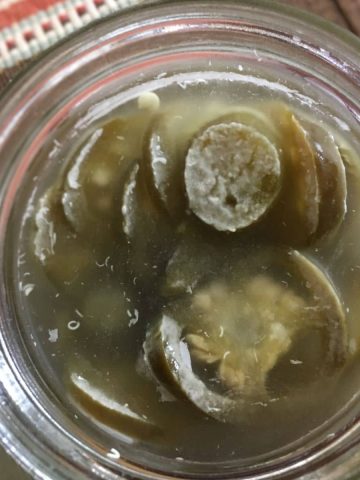Can Dogs Eat Sauerkraut?
Yes. Dogs benefit from eating sauerkraut and other fermented vegetables. Fermented vegetables are full of gut-healthy bacteria that aids in digestion and a more balanced gut.
Make sure you are only feeding your dog real fermented sauerkraut. Sauerkraut from a can or jar that is preserved in vinegar is void of any live gut-healthy bacteria. Although it is OK for people to eat, the sauerkraut you are looking for will say live, raw, or fermented on the packaging. And because it is live, you will find it in the refrigerated section of a grocery store, either the health food aisle or in the produce section.
Some foods are assumed to be full of probiotics, but depending on how they’re packaged, that may not always be the case. The process of pasteurization, which heats foods to kill harmful bacteria, can also kill the good bacteria in products when they’re canned.
You can also save a ton of money if you make it yourself; check out our homemade sauerkraut recipe.
How Much Sauerkraut Do I Give My Dog?
Probiotics can have a powerful effect on the GI system. The initial reaction could result in some bacterial die-off. So, go slowly. Dr. Karen Becker, DVM, goes into detail in this video on how to feed your dog fermented foods the right way. She suggests starting with 1-3 teaspoons for every 20 pounds of body weight.
Can Dogs Eat Sauerkraut with Caraway Seeds?
The ASPCA warns that caraway is toxic to dogs. Since caraway is a common ingredient of sauerkraut, be vigilant in reading the ingredients list when buying sauerkraut for your pets.
Caraway seed also goes by the name of Meridian fennel or Perisian Cumin. Both of these spices belong in the parsley family, however, they come from different plants.
Vomiting and diarrhea are two common symptoms that can occur after a dog eats caraway. The best thing you can do is take your dog to the veterinarian if you suspect they are sick from eating these seeds.
Why Feed a Dog Fermented Foods
Dogs can benefit from eating sauerkraut because it is full of vitamins such as vitamin A, B6, C, and vitamin K. Sauerkraut is also a good source of calcium, iron, and magnesium.
Furthermore, 70% of the immune system is based in the gut. If your dog's gut flora is out of balance, that means that 70% of his immune system is disrupted too.
How to Feed a Dog Sauerkraut
Because sauerkraut has such a strong smell, most dogs will avoid it. Sauerkraut often has a tangy flavor, and they won’t like that either.
To help your dog eat sauerkraut, start by adding a minimal amount, about ½ a teaspoon, to their regular food. Then, slowly increase how much you give them.
If your dog absolutely won’t eat it, no matter what, no worries, stick with digestive supplements; I recommend Purina FortiFlora Probiotics for Dogs. You can check the price on Amazon here.
How To Make Sauerkraut that Dogs Will Eat
Check out our homemade sauerkraut recipe. Just remember to omit caraway seeds and any extra spices.
Other Fermented Foods For Dogs
Different options for fermented foods include fish sauce, kombucha, root vegetables, whey, and dairy products like kefir, yogurt, buttermilk, and cheese. Dairy is the most common, but you should always try to use whole, unpasteurized milk products if possible.
Final Thoughts
Consistency is an essential factor when feeding a dog fermented foods. Adding it to their diet once in a while is pointless.
The goal is to create colonies of healthy gut bacteria in your dog’s intestines.
Remember that the stomach is not an easy environment for probiotics to survive in. By providing sauerkraut regularly, you’re giving the good bacteria a better chance of reaching the gut where they can colonize. Probiotics in the form of fermented food are already active, so they are more likely to survive than supplement alternatives.




